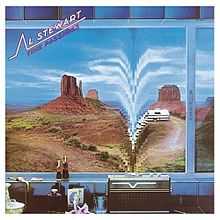Time Passages
From Wikipedia, the free encyclopedia
| Time Passages | ||||
|---|---|---|---|---|
 | ||||
| Studio album by Al Stewart | ||||
| Released | September 1978 (US), November 1978 (UK) | |||
| Recorded | June 1978 at Davlen Studios, Los Angeles | |||
| Genre | Rock | |||
| Length | 44:38 | |||
| Label |
UK: RCA (original release) EMI (1991 reissue) US: Arista (original release) Mobile Fidelity Sound Lab (audiophile release) | |||
| Producer | Alan Parsons | |||
| Al Stewart chronology | ||||
| ||||
| Professional ratings | |
|---|---|
| Review scores | |
| Source | Rating |
| Allmusic | |
Time Passages is the eighth studio album by Al Stewart, released in 1978. It is the follow-up to his 1976 album Year of the Cat. The album, like its predecessor, was produced by Alan Parsons. The album's title track (which, when edited, reached #7 on the Billboard charts) and "End of the Day" were both co-written by Peter White.
A digitally remastered version of the album was released in 2004.
Track listing
- "Time Passages" – 6:41
- "Valentina Way" – 4:04
- "Life in Dark Water" – 5:49
- "A Man for All Seasons" – 5:50
- "Almost Lucy" – 3:43
- "The Palace of Versailles" – 5:20
- "Timeless Skies" – 3:34
- "Song on the Radio" – 6:22
- "End of the Day" – 3:11
Historical references
- "A Man For All Seasons" refers to Sir Thomas More, statesman under Henry VIII of England (misidentified by Stewart as "Henry Plantagenet"[2]) and a Catholic martyr.
- "The Palace of Versailles", the former residence of the French Kings and a key site in early days of the French Revolution. The lyrics contain specific allusions to many events and figures of the revolution.
- "Life in Dark Water" - references the Marie Celeste.
Charts
Album – Billboard (North America)
| Year | Chart | Position |
|---|---|---|
| 1978 | Albums | 10 |
Singles – Billboard (North America)
| Year | Single | Chart | Position |
|---|---|---|---|
| 1979 | "Time Passages" | Pop singles | 7 |
| 1979 | "Time Passages" | Adult contemporary | 1 |
| 1979 | "Song on the Radio" | Pop singles | 29 |
Personnel
- Al Stewart - guitar, keyboards, vocals
- Peter White - guitar, keyboards, accordion
- Peter Robinson, Peter Solley, Peter Wood - keyboards, organ, piano
- Tim Renwick - electric guitar
- Robin Lamble - bass
- Mark Goldenberg - rhythm guitar
- Phil Kenzie - saxophone
- Stuart Elliott, Jeff Porcaro - drums
- Bill Linnane - lead guitar
- Arthur Tripp, Lindsey Elliott - percussion
- Brian Huddy, Joe Puerta, David Pack, James R. West, Krysia Kristianne, Jeff Borgeson - background vocals
- Andrew Powell - orchestration
- Alan Parsons - producer
References
- ↑ Allmusic review
- ↑ Nichols, Thomas M. (Spring 2001). "Soldiers and War: A Top Ten List". International Journal (Canadian International Council) 56 (2): 312–323, 317 n.1. Retrieved June 30, 2011. "In a 1980 interview, Stewart lamented his reference in the song about More to Henry Plantagenet when he meant Henry Tudor. How many of his fans caught the error is unknown."
| |||||||||||
| ||||||||||||||
This article is issued from Wikipedia. The text is available under the Creative Commons Attribution/Share Alike; additional terms may apply for the media files.